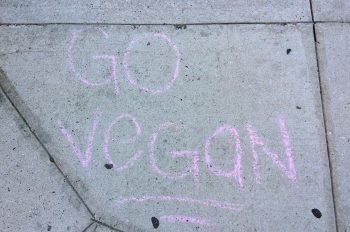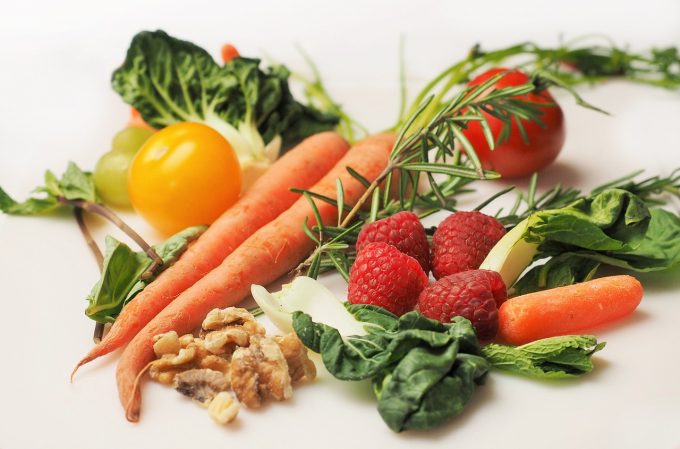“Why is it pronounced veeg-in?” We were sitting around a crowded table with a large gathering of friends and family when someone suddenly posed the question.

“Yeah,” another chimed in. “Why isn’t it vedj-in? Like vegetables?”
“I’m not really sure,” I replied. “That’s just how it’s pronounced.”
“Huh, I like vedj-in better.”
“Yeah,” a third person added. “Vegan just sounds so devilish.”
I felt stunned and, to be honest, a little insulted. I searched my brain for some counterpoint, but, in being caught so off guard, my mind had gone blank. So the sentence hung there for a brief moment, without response, until the conversation veered off onto another subject. As everyone else moved on unfazed, that last word clawed at the inside of my head. Devilish. Devilish.
Defensive impulses bubbled up inside of me. That adjective was completely incongruous with the spirit, intention, and practice of veganism. I felt annoyed and frustrated that this word that was so precious and significant to me, that held so much hope for good in the world, could be held up against such an inappropriate descriptor. But there was something else, another feeling underlying the others, likely the very one that had rendered me speechless: on some level, I understood what this person meant.
When I first went vegan, it took a while before I felt comfortable associating myself with the word. To my newly vegan ears, it sounded heavy and provocative. My pre-vegan conceptions, though I’d realized they were off-base, were still fresh in my mind: vegans are crazy, they’re extreme, militant, self-righteous—all things that conjure images in the imagination which fall about a stone’s throw from devilish. I hesitated to adopt the label because I worried about how others might perceive me…because of perceptions I’d once held myself.
The v-word was coined in 1944 by Donald Watson, the founder of The Vegan Society. He took the first and last letters of “vegetarian” and pulled them together, forming a term that was literally “the beginning and end of vegetarian,” naming the lifestyle which brings the ethic of not perpetrating harm to its natural, comprehensive conclusion. The official Vegan Society definition of the term is “a philosophy and way of living which seeks to exclude—as far as is possible and practicable—all forms of exploitation of, and cruelty to, animals for food, clothing or any other purpose.”
A lifestyle that opposes cruelty and exploitation? Outlined in black and white, held apart from the convolution of societal bias, it sure sounds like the opposite of devilish to me.
I’ve no doubt that some words inherently sound silly, harsh, beautiful, or even devilish, but many words feel a certain way because of past associations or ideas we have about what they mean. For many people, there is a name that they cannot stand because they associate it with someone in their past who wasn’t a nice person, while another person may love the exact same name because they connect it with someone else who was very kind. We’re not beholden to these perceptions, though. Through understanding and new experience, our feelings can change.
My own perception of the v-word has shifted dramatically from my pre-veg days. By coming to know it more intimately and cultivating positive associations, when I hear the word today, it sounds like light, peace, compassion, and hope. It radiates goodness, the promise that no one was harmed to make that which bears the label or by those who use it to describe themselves. As the vegan movement continues to gain momentum, the word will naturally soften in the ears of the mainstream. For some time to come, however, there will still be people for whom it feels threatening in some way. We can all help to recalibrate the ring of this wonderful word by understanding its meaning, embodying the values that define it, speaking it often, and by standing up for its true definition when it’s misheard by those whose ears have yet to adapt.
If I could go back in time with all my wits about me and sit at that crowded table again, I’d fill that moment of pause before the conversation shifted, pulling the word “devilish” from the air and offering up another in its stead.
“Yeah, I can see that,” I’d say. “I used to hear the word vegan that way too, but now that I really understand what it means—kindness and compassion for all beings—well, I think it sounds just beautiful.”
 Britt LoSacco, VLCE is a writer, recipe developer, and mama to an adorable and thriving plant-built kiddo. She currently lives with her all-vegan crew (husband, son, and little dog too!) in Brooklyn, NY. You can follow her on Instagram at @leavesofkale and find her delicious creations and musings on life and veganism on her blog Leaves of Kale.
Britt LoSacco, VLCE is a writer, recipe developer, and mama to an adorable and thriving plant-built kiddo. She currently lives with her all-vegan crew (husband, son, and little dog too!) in Brooklyn, NY. You can follow her on Instagram at @leavesofkale and find her delicious creations and musings on life and veganism on her blog Leaves of Kale.


So interesting how we each have the power in our minds to GIVE something a meaning. Even just a silly little word like ‘vegan’!
We see examples of this all the time in life. We even do it to ourselves. We can begin to dread something just by focusing on the bad parts of it, like what it takes away from us rather than what it gives to us.
I’ve talked to new vegans who have tortured themselves by thinking about how many delicious foods they’ve “lost”, like bacon or cheese.
What is to be gained instead of lost? Their health, their contribution the the health of the planet, and one less grocery bill every week that supports the horror of animal agriculture. “Vegan” seems to be a pretty great word now!